|
|
|
Sort Order |
|
|
|
Items / Page
|
|
|
|
|
|
|
| Srl | Item |
| 1 |
ID:
179014


|
|
|
|
|
| Summary/Abstract |
This study investigates the perceptions of the local female population towards displaced Syrians in Turkey. The research is based on the analysis of data from participant observation and discourse analysis of conversations in five ‘gün’ groups, which are informal, social, and fairly regular gatherings of local women, in Mersin in Spring 2018. Five common discursive patterns are identified: stereotyping, biased perceptions, ‘us’ vs. ‘them’, scapegoating, and discrimination. We conclude that local women’s discourses reveal marginalisation and discursive exclusion of displaced Syrians in Turkey, and argue that such othering originates not only from existing cultural differences, language barriers, and lack of trust, but also from lack of sustained social interaction between these groups. Further studies should facilitate both knowledge sharing about the additional vulnerabilities such attitudes create for displaced people and potential paths for meaningful engagement between local community members and forcibly displaced people.
|
|
|
|
|
|
|
|
|
|
|
|
|
|
|
|
| 2 |
ID:
179015
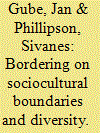

|
|
|
|
|
| Summary/Abstract |
This article illustrates the interface of ethnic identities and a multi-ethnic learning environment in a predominantly Chinese society. Hong Kong – whilst reputed as an Asian international city – has displayed reticence in promoting multicultural initiatives and inclusiveness at a policy level. In this context, this study draws on a sociocultural perspective and interviews with a group of ethnic minority Filipino secondary school students. The interview data point to juxtapositions of ethnic identities with reference to students’ interactions with peers from same and different ethnic groups, ethnic in-group practices, and a schooling discourse that reflects Chinese language expectations and recognition of cultural diversity. The analysis, as a result, specifies how schooling experiences in this case become grounds for identity tensions in being a Filipino and a Hong Kong person. These tensions caution against tacit sociocultural relations in learning environments resulting from school-initiated multicultural practices without broader and explicit policy support for culturally diverse student population.
|
|
|
|
|
|
|
|
|
|
|
|
|
|
|
|
| 3 |
ID:
179013


|
|
|
|
|
| Summary/Abstract |
This paper is about self-identification by a sample of young people with various migrant backgrounds in Sweden. In a survey we asked them how they present themselves to others in different contexts (in their schools and neighbourhoods or when they are out of Sweden). Our findings suggest that young people’s identification is not fixed. The paths to these various forms of identification are shaped by a variety of individual (class background, parents’ country of origin) and social factors (friendship networks and school composition). The results indicate that those who identified themselves as Swedish or hyphenated tended to be quite similar as regards their other characteristics, while those who presented themselves with the parents’ birth country or religious affiliation have very little in common.
|
|
|
|
|
|
|
|
|
|
|
|
|
|
|
|
| 4 |
ID:
179009
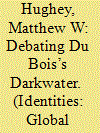

|
|
|
|
|
| Summary/Abstract |
The initial 1920 publication of W. E. B. Du Bois’s Darkwater: Voices from Within the Veil sold over 15,000 copies. Its initial 1969 reissue, and subsequent reprints, have since garnered even more sales and thousands of citations. Darkwater is now considered a classic. The centenary of the publication (1920–2020) provides an opportune moment to reflect on the book’s significance and disparate interpretations. In this article, I first examine the antecedents of Du Bois’s Darkwater. I then examine the book reviews, announcements, book club declarations, and advertisements and I subsequently map the variations of their coverage, debate, and emphases. I conclude with some thoughts on sociology’s relative dismissal of Darkwater until recent years and what sociology’s modest rediscovery of, and debates over, Du Bois portend.
|
|
|
|
|
|
|
|
|
|
|
|
|
|
|
|
| 5 |
ID:
179010
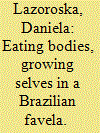

|
|
|
|
|
| Summary/Abstract |
The economic growth of Brazil in the early and mid-2000s has created opportunities for people like my interlocutors, the young and media-savvy residents of Brazilian favelas to consume and partake in a global market of the production of the self. These have nourished their pursuit for both diversity and difference and shaped the eclectic qualities of their consumption practices. In its plural forms, consumption, or eating, which will take center stage in this article, has enabled an expanded palette and palate of being, acting and relishing life in the favela. I argue that eating can be understood as a method of becoming; it can be used as an active attempt at asserting agency over one’s body and, by extension, at asserting subjectivity in a lifeworld open to multiple dimensions of uncertainty and insecurity.
|
|
|
|
|
|
|
|
|
|
|
|
|
|
|
|
| 6 |
ID:
179011
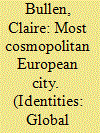

|
|
|
|
|
| Summary/Abstract |
Marseille’s identity as a cosmopolitan place was a key element in the city’s application to be European Capital of Culture (ECOC) in 2013, where the city was represented as ‘the most cosmopolitan’ in Europe. The language of cosmopolitanism enabled city leaders to align Marseille with ‘European’ values of cultural diversity and to highlight the city as a place of diverse cultural production. Such claims have incited interest in a country where cultural and ethnic differences are often considered a challenge to the ideals of French Republicanism. Narratives of social and cultural relations in Marseille are in fact highly variable. This article uses a neighbourhood arts project as a case study through which to explore and situate understandings, representations and experiences of cultural and social relations in the city.
|
|
|
|
|
|
|
|
|
|
|
|
|
|
|
|
| 7 |
ID:
179012
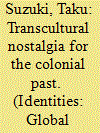

|
|
|
|
|
| Summary/Abstract |
This study examines how different cultural groups forge a shared longing for the past, or transcultural nostalgia. The article suggests that each group’s past and present political-economic conditions are key contributors to transcultural nostalgia. Furthermore, it suggests that travel between spaces is a key means of transcultural remembering. It historically and ethnographically examines the transcultural nostalgia among Okinawans who had migrated to the Northern Mariana Islands under the Japanese rule and repatriated after WWII and the indigenous islanders who had grown up as Japanese colonial subjects, as well as the repatriates’ post-war ‘spirit-consoling’ pilgrimages to the Marianas.
|
|
|
|
|
|
|
|
|
|
|
|
|
|
|
|
|
|
|
|
|